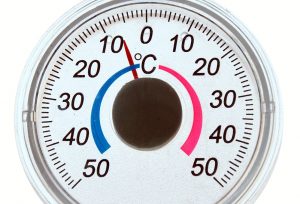 When it comes to electrical enclosures, ambient refers to the temperature just outside of the enclosure. In many applications, this temperature is well below the system’s maximum operating temperature and offers a sufficient baseline for cooling the enclosure. However, in some applications, a system’s high demands and/or the environment surrounding the equipment makes it necessary to cool the electrical enclosure to below the ambient temperatures outside of it. In such cases, companies can still benefit from more efficient, cost-effective, and eco-friendly thermal management thanks to advanced below-ambient heat exchangers. (more…)
When it comes to electrical enclosures, ambient refers to the temperature just outside of the enclosure. In many applications, this temperature is well below the system’s maximum operating temperature and offers a sufficient baseline for cooling the enclosure. However, in some applications, a system’s high demands and/or the environment surrounding the equipment makes it necessary to cool the electrical enclosure to below the ambient temperatures outside of it. In such cases, companies can still benefit from more efficient, cost-effective, and eco-friendly thermal management thanks to advanced below-ambient heat exchangers. (more…)
When Is an Ambient Heat Exchanger Appropriate?
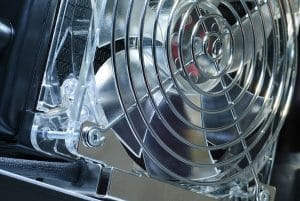 Ambient cooling has long been one of the greatest advantages that heat exchangers provide for most applications. The idea is to cool an electrical enclosure to just above the ambient temperature outside of it, which is usually well below an application’s maximum operating temperature. The initial implementation and success of ambient heat exchangers showed companies that they no longer needed to chill electrical enclosures and other technology by chilling them with air conditioning units. Today, heat exchangers come in several different variations, though simple ambient cooling is still often the most appropriate solution. (more…)
Ambient cooling has long been one of the greatest advantages that heat exchangers provide for most applications. The idea is to cool an electrical enclosure to just above the ambient temperature outside of it, which is usually well below an application’s maximum operating temperature. The initial implementation and success of ambient heat exchangers showed companies that they no longer needed to chill electrical enclosures and other technology by chilling them with air conditioning units. Today, heat exchangers come in several different variations, though simple ambient cooling is still often the most appropriate solution. (more…)
A Few Advantages of Heat Exchangers to Food Production
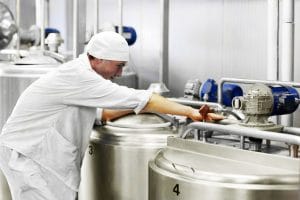 The ability to produce and deliver food products across the country (and the world) with optimal efficiency and safety has been the main focus of technological innovation within the industry. From automated sorting and packaging equipment to temperature-controlled storage and transportation units, technology has helped food producers extend their reach far beyond what was ever possible before. In many cases, that innovation has included or been made possible by the advancement of modern heat exchangers, which have made thermal management a much more efficient, reliable, and eco-friendly process than ever. (more…)
The ability to produce and deliver food products across the country (and the world) with optimal efficiency and safety has been the main focus of technological innovation within the industry. From automated sorting and packaging equipment to temperature-controlled storage and transportation units, technology has helped food producers extend their reach far beyond what was ever possible before. In many cases, that innovation has included or been made possible by the advancement of modern heat exchangers, which have made thermal management a much more efficient, reliable, and eco-friendly process than ever. (more…)
Are Heat Exchangers Safe for Hazardous Locations?
 Many of today’s most vital industries, such as oil and gas production, operate in locations and under conditions that are typically more demanding than traditional technology and equipment can handle. Climates can often exceed normal maximum operating temperatures, and the immediate environment can be rife with hazardous, volatile substances. The challenge for implementing technology under such conditions include ensuring that it can continue operating under extreme conditions, and that it can do so with optimal safety. Meeting these challenges has become easier, especially in the realm of thermal management, thanks to the advent of heat exchangers designed specifically to function safely and optimally under the most hazardous conditions. (more…)
Many of today’s most vital industries, such as oil and gas production, operate in locations and under conditions that are typically more demanding than traditional technology and equipment can handle. Climates can often exceed normal maximum operating temperatures, and the immediate environment can be rife with hazardous, volatile substances. The challenge for implementing technology under such conditions include ensuring that it can continue operating under extreme conditions, and that it can do so with optimal safety. Meeting these challenges has become easier, especially in the realm of thermal management, thanks to the advent of heat exchangers designed specifically to function safely and optimally under the most hazardous conditions. (more…)
The Details of a Heat Exchanger Feasibility Study
 As the art (and the importance) of electrical thermal management has evolved, versatility and customization have become important aspect of modern heat exchanger technology. They’ve also become significant challenges – designing advanced thermal management technology is one thing, but ensuring that every innovative design performs as expected is another. Through comprehensive design, analysis, and feasibility testing, manufacturers can create increasingly more advanced heat exchanger designs while minimizing errors, reducing turn around times, and maximizing overall efficiency. (more…)
As the art (and the importance) of electrical thermal management has evolved, versatility and customization have become important aspect of modern heat exchanger technology. They’ve also become significant challenges – designing advanced thermal management technology is one thing, but ensuring that every innovative design performs as expected is another. Through comprehensive design, analysis, and feasibility testing, manufacturers can create increasingly more advanced heat exchanger designs while minimizing errors, reducing turn around times, and maximizing overall efficiency. (more…)
Manufacturing Made Easier with the Help of Heat Exchangers
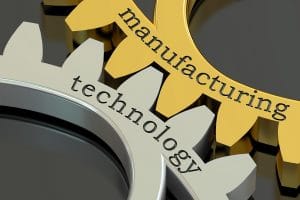 The many different facets of technology have made it a defining characteristic of most modern societies. That includes virtually every industry that powers those societies, including all forms of manufacturing. Heat exchangers played a seemingly small role in the advancement of those technologies, but it’s a role that has proven to be pivotal. For example, at first, heat exchangers were simply used as an alternative electrical thermal management solution, allowing manufacturers to cut their reliance on more costly air conditioners. Now, however, modern heat exchangers and the science behind their thermal management processes have become key to several significant advanced forms of manufacturing technology. (more…)
The many different facets of technology have made it a defining characteristic of most modern societies. That includes virtually every industry that powers those societies, including all forms of manufacturing. Heat exchangers played a seemingly small role in the advancement of those technologies, but it’s a role that has proven to be pivotal. For example, at first, heat exchangers were simply used as an alternative electrical thermal management solution, allowing manufacturers to cut their reliance on more costly air conditioners. Now, however, modern heat exchangers and the science behind their thermal management processes have become key to several significant advanced forms of manufacturing technology. (more…)
3 Things Heat Exchangers Can Do that Air Conditioners Can’t
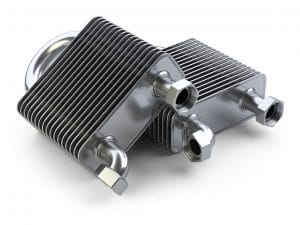 Some of the differences between heat exchangers and air conditioners are obvious, such as the reduced energy and overall costs that come with implementing the more streamlined thermal management solutions. However, the specific ways in which heat exchangers differ from more traditional solutions aren’t always as obvious. For example, the reason why they don’t require as much energy or as high of a cost to operate is because of the specific differences in how they approach electrical thermal management. (more…)
Some of the differences between heat exchangers and air conditioners are obvious, such as the reduced energy and overall costs that come with implementing the more streamlined thermal management solutions. However, the specific ways in which heat exchangers differ from more traditional solutions aren’t always as obvious. For example, the reason why they don’t require as much energy or as high of a cost to operate is because of the specific differences in how they approach electrical thermal management. (more…)
A Look at Heat Exchangers’ Contribution to Automation
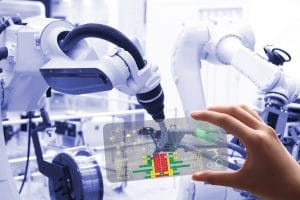 The ability to make thermal management less of a burden and more of an advantage has made heat exchangers a truly disruptive force in virtually all industries. From manufacturing to agriculture and much more, more efficient electrical thermal management has also paved the way for increasingly more innovation in the form of advanced technologies. For example, thanks to being able to keep technology properly cooled with minimal interaction, minimal energy usage, and maximum reliability, heat exchangers have been an essential advantage in creating and implementing automated technology and machinery. (more…)
The ability to make thermal management less of a burden and more of an advantage has made heat exchangers a truly disruptive force in virtually all industries. From manufacturing to agriculture and much more, more efficient electrical thermal management has also paved the way for increasingly more innovation in the form of advanced technologies. For example, thanks to being able to keep technology properly cooled with minimal interaction, minimal energy usage, and maximum reliability, heat exchangers have been an essential advantage in creating and implementing automated technology and machinery. (more…)
3 Reasons Heat Exchangers Work for NEMA Enclosures
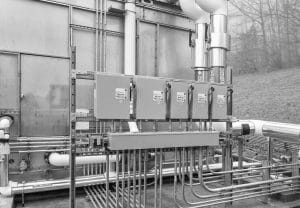 The National Electrical Manufacturers Association, or NEMA, regulates the various grades of electrical enclosures that are often utilized in manufacturing and other industrial applications. The point of the standards that NEMA sets forth is to maintain an optimal level of safety and functionality for electrical enclosures that often operate in hazardous conditions. For instance, adhering to the standards helps ensure an adequate degree of protection for personnel from accessing hazardous components of the enclosure and protection for the enclosure against certain environmental elements. Because of these high demands, heat exchangers are often the ideal solution for meeting these standards and ensuring optimal electrical thermal management for NEMA enclosures. (more…)
The National Electrical Manufacturers Association, or NEMA, regulates the various grades of electrical enclosures that are often utilized in manufacturing and other industrial applications. The point of the standards that NEMA sets forth is to maintain an optimal level of safety and functionality for electrical enclosures that often operate in hazardous conditions. For instance, adhering to the standards helps ensure an adequate degree of protection for personnel from accessing hazardous components of the enclosure and protection for the enclosure against certain environmental elements. Because of these high demands, heat exchangers are often the ideal solution for meeting these standards and ensuring optimal electrical thermal management for NEMA enclosures. (more…)
Extended Benefits of Better Thermal Management
 The impact of thermal management can be felt in virtually every aspect of a company’s operations. From the reliability of their equipment to the level of energy the company consumes, better thermal management solutions equate to better, more reliable, and more efficient processes. However, the benefits of streamlining thermal management processes with the help of modern heat exchangers goes further than the operations contained within a facility’s four walls. From improving power production to optimizing pollution control measures such as wastewater treatment, communities as a whole have benefited, as well. (more…)
The impact of thermal management can be felt in virtually every aspect of a company’s operations. From the reliability of their equipment to the level of energy the company consumes, better thermal management solutions equate to better, more reliable, and more efficient processes. However, the benefits of streamlining thermal management processes with the help of modern heat exchangers goes further than the operations contained within a facility’s four walls. From improving power production to optimizing pollution control measures such as wastewater treatment, communities as a whole have benefited, as well. (more…)







